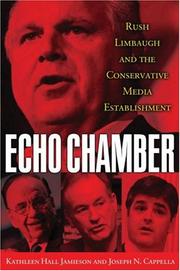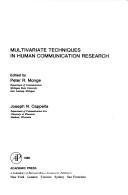| Listing 1 - 6 of 6 |
Sort by
|

ISBN: 9780195366822 Year: 2008 Publisher: Oxford [etc.] Oxford University Press
Abstract | Keywords | Export | Availability | Bookmark
 Loading...
Loading...Choose an application
- Reference Manager
- EndNote
- RefWorks (Direct export to RefWorks)
Conservatism --- United States --- Journalism --- Objectivity

ISBN: 1280441674 0195358090 1601299915 9781601299918 9780195090642 0195090640 9780195358094 9781280441677 9786610441679 6610441677 0195090632 0195090640 9780195090635 0197726208 Year: 1997 Publisher: New York Oxford University Press
Abstract | Keywords | Export | Availability | Bookmark
 Loading...
Loading...Choose an application
- Reference Manager
- EndNote
- RefWorks (Direct export to RefWorks)
Jamieson and Cappella examine how the media cover political campaigns and significant legislation. They conclude that by focusing on the game rather than the substance the media are engendering cynicism amongst the general public.
Press and politics --- Government and the press --- Mass media --- Influence. --- United States. --- Reporters and reporting. --- #SBIB:021.IO --- #SBIB:309H1814 --- #SBIB:328H31 --- Influence --- Pers: politieke, juridische, ethische, ideologische aspecten (o.a. censuur, persvrijheid) --- Instellingen en beleid: VSA / USA --- Internal politics --- Mass communications --- United States --- United States of America --- Congress
Book
ISBN: 9780195398601 Year: 2010 Publisher: Oxford Oxford University Press
Abstract | Keywords | Export | Availability | Bookmark
 Loading...
Loading...Choose an application
- Reference Manager
- EndNote
- RefWorks (Direct export to RefWorks)
Political sociology --- Mass communications --- Limbaugh, Rush --- United States of America

ISBN: 012504450X 9780125044509 Year: 1980 Publisher: New York (N.Y.) Academic press
Abstract | Keywords | Export | Availability | Bookmark
 Loading...
Loading...Choose an application
- Reference Manager
- EndNote
- RefWorks (Direct export to RefWorks)
Communication --- Multivariate analysis --- Analyse multivariée --- Statistical methods --- Research --- Recherche --- Communications research --- 316.77 --- 303 --- -Communications research --- #SBIB:309H02 --- Communication, Primitive --- Mass communication --- Sociology --- Communicatiesociologie --- Methoden bij sociaalwetenschappelijk onderzoek --- Communicatiewetenschap: algemeen --- Communications research. --- Statistical methods. --- 303 Methoden bij sociaalwetenschappelijk onderzoek --- 316.77 Communicatiesociologie --- Analyse multivariée --- Communication - Statistical methods
Book
ISBN: 9781506314631 Year: 2015 Publisher: Los Angeles [etc.] Sage Publications
Abstract | Keywords | Export | Availability | Bookmark
 Loading...
Loading...Choose an application
- Reference Manager
- EndNote
- RefWorks (Direct export to RefWorks)
Multi

ISBN: 9781477314579 1477314571 147731458X 9781477314586 9781477314555 1477314555 9781477314562 1477314563 Year: 2021 Publisher: Austin
Abstract | Keywords | Export | Availability | Bookmark
 Loading...
Loading...Choose an application
- Reference Manager
- EndNote
- RefWorks (Direct export to RefWorks)
Lies and inaccurate information are as old as humanity, but never before have they been so easy to spread. Each moment of every day, the Internet and broadcast media purvey misinformation, either deliberately or accidentally, to a mass audience on subjects ranging from politics to consumer goods to science and medicine, among many others. Because misinformation now has the potential to affect behavior on a massive scale, it is urgently important to understand how it works and what can be done to mitigate its harmful effects. Misinformation and Mass Audiences brings together evidence and ideas from communication research, public health, psychology, political science, environmental studies, and information science to investigate what constitutes misinformation, how it spreads, and how best to counter it. The expert contributors cover such topics as whether and to what extent audiences consciously notice misinformation, the possibilities for audience deception, the ethics of satire in journalism and public affairs programming, the diffusion of rumors, the role of Internet search behavior, and the evolving efforts to counteract misinformation, such as fact-checking programs. The first comprehensive social science volume exploring the prevalence and consequences of, and remedies for, misinformation as a mass communication phenomenon, this will be a crucial resource for students and faculty researching misinformation, policymakers grappling with questions of regulation and prevention, and anyone concerned about this troubling, yet perhaps unavoidable, dimension of current media systems.
Mass communications --- communicatie --- massamedia --- Mass media --- Communication. --- Common fallacies --- Deceptive advertising --- Audiences. --- Social aspects.
| Listing 1 - 6 of 6 |
Sort by
|

 Search
Search Feedback
Feedback About UniCat
About UniCat  Help
Help News
News